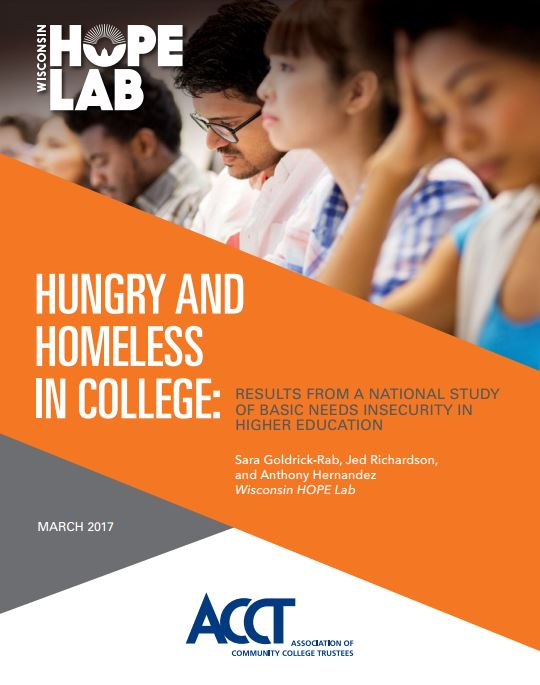The Association of Community College Trustees (ACCT), in collaboration with the Wisconsin HOPE Lab, today announced the release of Hungry and Homeless in College, a new research report that assesses food and housing insecurity among community college students. Authors Sara Goldrick-Rab, Jed Richardson and Anthony Hernandez conducted a survey of more than 33,000 students at 70 community colleges in 24 states--the broadest survey of its kind--that describes the extent to which students are adversely affected by unmet basic needs while pursuing higher education.
"Of the students we surveyed, one in three reported that they had gone hungry while enrolled in college, and half were housing insecure--and nearly 14 percent were homeless," said Sara Goldrick-Rab, professor of higher education policy and sociology at Temple University and the founder of the Wisconsin HOPE Lab. "This shouldn't happen in the United States--but the more we learn about students' unmet needs, the better we can address them."
"Proper nutrition and safe and stable housing are not only basic human needs," said ACCT President and CEO J. Noah Brown. "Students' academic performance can suffer tremendously when these needs are not met. This is a humanitarian concern as well as a priority for all community colleges."
Among the findings:
- There is surprisingly little geographic variation in hunger and homelessness among community college students: it is not isolated to urban or high-poverty colleges, and is prevalent in all regions of the country.
- This is the first study to consider foster youth. Thirty percent (30%) of the former foster youth surveyed were homeless.
- One-third of students experiencing food or housing insecurity were both working and receiving financial aid.
- Sixty-three percent (63%) of parenting students were food insecure and almost 14% were homeless, but only about 5% received any child-care assistance.
- Homeless community college students are more likely to work long hours at low-quality jobs, and get less sleep.
"It's especially concerning," Goldrick-Rab said, "that despite being in such vulnerable circumstances, almost one-third are receiving student loans, further compromising their situations."
Hungry and Homeless in College expands on a pilot survey of 4,000 students from 10 community colleges in seven states that was conducted in 2015. The Kresge Foundation supported the expanded survey.
"We believe all people should lead self-determined lives and participate in the economic mainstream," said William F. L. Moses, managing director of Kresge's Education Program. "We know that education is the greatest economic equalizer--and we believe that every student should have access to a high-quality higher education without compromising his or her living conditions and safety, and without skipping meals."
"To date, no federal funding has ever been allocated to study homelessness and hunger among college students," Goldrick-Rab said. "Hungry and Homeless in College represents a significant sample of community college students, but a comprehensive study to gain a thorough grasp of these issues among students nationwide is long overdue."
The full report, including profiles of three community college students and policy recommendations for community colleges, state and federal lawmakers, is available at the ACCT and Wisconsin HOPE Lab websites.
About the Wisconsin HOPE Lab
The Wisconsin HOPE Lab is the nation's first laboratory for translational research aimed at improving equitable outcomes in postsecondary education. The Lab helps to make findings from basic science useful for practical applications that enhance college attainment and human well being throughout the state, and in turn, the nation.
About The Kresge Foundation
The Kresge Foundation is a $3.6 billion private, national foundation that works to expand opportunities in America's cities through grantmaking and social investing in arts and culture, education, environment, health, human services, and community development in Detroit. In 2015, the Board of Trustees approved 371 grants totaling $125.2 million, and nine social investment commitments totaling $20.3 million. For more information, visit kresge.org.

